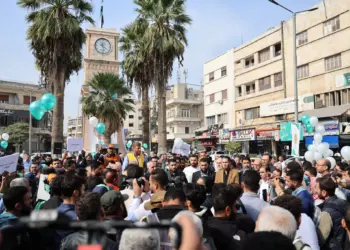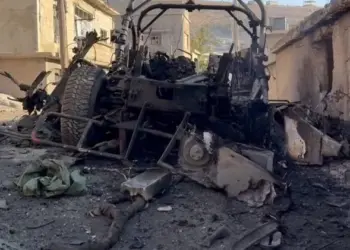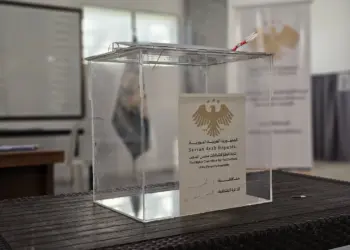For the first time in 14 years, Syrians are marking the anniversary of the uprising without Bashar al-Assad in power. The 2011 uprising began peacefully. Protesters echoed the calls of the Arab Spring for “bread, freedom and social justice,” only for the regime to respond with an immediate, brutal security crackdown. In the 14 years that followed, the regime and its main backers (Iran and Russia) carried out countless brutalities against the Syrian people, including the use of chemical weapons, siege and starvation, and detention and torture. The lightning offensive that ousted Assad in December 2024 caught many by surprise, especially Arab states who had spent the year prior opening the door to normalization with the regime.
Now, with Assad having fled to Moscow, Ahmad al-Shara’a, former leader of Hay’at Tahrir al-Sham (HTS), has declared himself interim president during what is already a precarious transition period. Al-Shara’a and the caretaker authorities now find themselves in a rare position to shape Syria’s future. This fragile transition must be inclusive and led by competent individuals who can establish a credible, inclusive and non-sectarian model of governance. Syria will be truly free when the hopes and demands of 2011 are realized: meaningful social and economic reforms, the dismantling of the security state, an end to corruption and cronyism, and the establishment of inclusive national and local governance.
Assad’s shadow
The Syria of 2011 had endured more than a decade under Bashar al-Assad, whose early promises of modernization gave way to a brutal replication of his father’s despotic rule—going far beyond even the horrors of Hama and Tadmur that became defining moments of Hafez al-Assad’s rule in the 1980s.
Under the Assads, pre-2011 Syria functioned as a police state, with the security apparatus deeply embedded into every aspect of society. The old saying, “The walls have ears,” reflected the omnipresence of informants and intelligence networks, which led to imprisonment for even minor offenses before the uprising. Many Syrians resorted to coded language to evade the secret police—using words like “parsley” or “mint” for dollars and “aunt’s house” for prison.
Decades of authoritarian rule, followed by 14 years of war, left deep scars on Syrian society. Trauma runs deep across the country. While all areas of Syria suffered at the hands of the regime, the contours of this trauma differ from one area to the next. Areas of control determined the type and extent of abuses inflicted on civilians by the regime, while non-state armed groups, ISIS and internationally backed proxy forces all committed abuses in different areas of the country. Recent massacres targeting Alawi populations in Latakia and Tartous in early March serve as grim reminders that wartime divisions and sectarian animosities will not fade easily. Syria is a diverse country of faiths and cultures, and to move forward, the caretaker government must unequivocally commit to safeguarding the rights and well-being of all its people.
A new Syria
The work of rebuilding Syria from the ground-up cannot be undertaken by a select few. As new mass graves are unearthed across the country, estimates of those killed during the war are likely drastic undercounts: a 2022 estimate from UNOCHA puts the number at over 300,000, although other sources estimate the total to be well over half a million people. Hundreds of thousands of victims and survivors have much to contribute to the long transition process and should form the centre of transitional efforts moving forward. Former opposition-held communities that saw some of the worst of the regime’s crimes represent vital constituencies in the new, free Syria—just as they were at the onset of the uprising.
But if the uprising’s ideals are to endure, all segments of Syrian society must have a voice in shaping the nation’s future. All aspects of Syrian society, its religious and ethnic minorities, political and armed groups, and women must have a voice in the new Syria.




